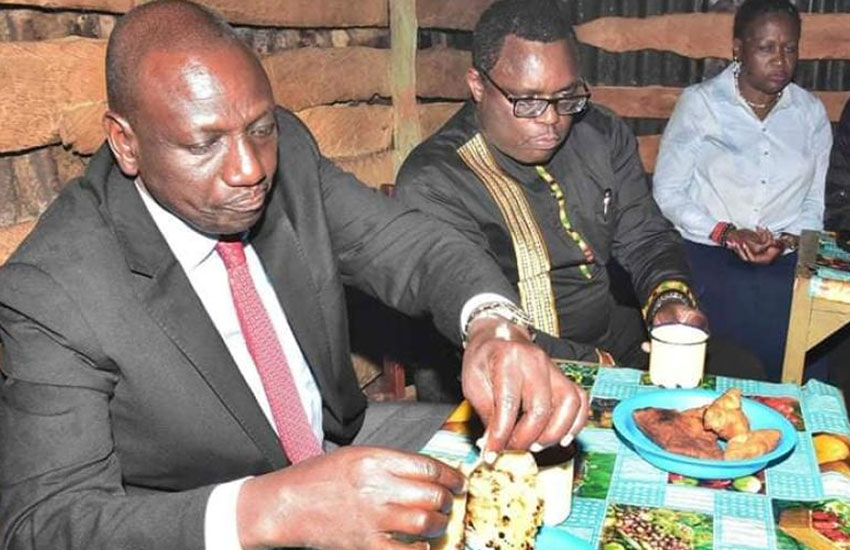
In 2018, Members of Parliament complained about the quality of food served in Parliament’s restaurant. This was not the first time they had beef with the fare they are served.
In 2015, the MPs dispatched the National Assembly’s Catering Committee to India, Netherlands and Ethiopia on a bench-marking tour.
Had they bothered to ask Embakasi West MP George Theuri, they would have saved taxpayers loads of money. For when hunger pangs bite, Mheshimiwa does not bother with the cafeteria in Parliament.
He strides into Wakwitoo kibanda for lunch where he mingles with wananchi without minding the occasional rat and well-fed cockroaches.
Describing kibanda food as sumptuous and irresistible, Theuri says: “I love eating in vibandas because the food is always fresh and delicious. You can’t compare it with the stuff served in five star hotels.” He adds that he is least bothered about public opinion because he is a simple man.
Food vibandas are patronised by the high and mighty. When he was President, Mzee Moi was known to occasionally pop into a kiosk for nyoyo and tea. Other notables include Deputy President William Ruto and other senior political leaders.
In fact, it is not uncommon to find big vehicles worth millions parked outside a smoky shack or observe men in designer suits, shoes and colognes walking out of some hovel looking sufficiently nourished with a toothpick propped between their lips.
Ben Mulwa, a Governance Consultant, is a regular customer of vibandas in Westlands and Lavington where he says the food is both pocket-friendly yummy.
“The food is fresh, unlike big hotels you will be served leftovers without your knowledge. I really love their chapatis. Their food is also not bland because it is cooked on jikos as opposed to gas cookers,” he says.

He faults people who claim vibandas are unhygienic, saying they end up eating junk in classy hotels. According to Mulwa, you are more likely to get food poisoning in a big hotel than in a kibanda.
“I have never had a stomach problem after a meal at a kibanda. We have a psychological problem in Kenya. We are conditioned to think that vibanda are for the poor and that eating expensive rubbish in big hotels makes you well off. The funny thing is Kenyans find it cool when a mzungu eats at a kibanda but they will start gossiping that you are broke if they see you at a kibanda,” Mulwa says.
Today, food vibandas are not concentrated in the poor sections of the city but also dot middle and upper-class and are patronised by people who command six digit salaries.
But the irony is that while vibandas feed millions of Nairobians, create employment and keep the economy fluid by buying tonnes of condiments and generating millions of shillings for the County Government, they are largely ignored. They are not provided for in city plans, often squat on dusty roadsides and beneath high voltage power lines. They also get flattened by County officials at short notice.
It is instructive that the Nairobi County Government does not have data on the number of street food dealers according to a source in the Trade Department. But Kenya National Alliance of Street Vendors and Informal Traders (KENASVIT) say they are about 30,000 food vendors in Nairobi. With each with about 60 customers daily, the kiosks serve close to two million Nairobains daily.

KENASVIT Nairobi County representative Joel Maingi says food vendors form the majority of street vendors and informal traders. “We have approximately 30,000 vendors and their contribution to economy cannot be overlooked. In the food chain, they play a big role, buying farm produce and preparing the final product,” Maingi says.
Vendors pay a county levy that ranges from Sh75 to Sh150 two or three times per week, depending on location. On average, Sh100 charge weekly translates to about Sh3 million weekly revenue for the county.
And they are here to stay. A survey conducted in 2009 by Dr Mary Oyunga, now a Senior Research Officer at Kenya Agricultural and Livestock Research Organisation indicated a significant increase of roadside food businesses in Nairobi from 1980s and 1990s in low income and industrial areas, and a noticeable shift in middle-class areas. “More recently, due to the increase in urban populations, the number of street food vendors/hawkers has risen greatly in response to the need to feed larger populations.
“This has been heightened by the daily movement from residential areas to working places that has created need among many working people to eat outside the home more often,” she stated.
A report by Hungry Cities Partnership in 2017, focusing on Nairobi County also revealed that the majority of Nairobi’s food purchases are from informal food vendors and that over 80 per cent of consumer food purchased in Nairobi is bought in the informal food sector.
“In Kenya as a whole, food retailing and services account for at least one-third of informal and semi-formal retail activity, The survey stated.

Albert Maina manages Potbase, a kibanda at Bus Station. He says the business can rake in Sh20,000 daily. Their specialty being matumbo, nyama and matoke and on average, he serves 600 customers a day. “In a kibanda you can bargain for food. Most people refuse to eat in hotels because of poor service and for some; having that taste of fresh food in the kibanda makes them feel like they are eating at home,” Maina claims.
Apart from taste, price is the biggest attraction for patrons is affordability.
At San Siro kibanda in town, for only Sh15 you can have a steaming cup of tea. In hotels, a smaller cup of tea costs between Sh50 and Sh300. Esther Wangari, the owner, says she serves about 800 customers, a mix of office workers and casual labourers.
“With Sh50 you can have githeri sukuma and for Sh100 you can have ugali, mutton and veggies,” she says.
Klabu in the precincts of University of Nairobi serves students and staff there but outsiders have sneaked into their menu and they love it. With Sh30, you can munch stew and a chapati. For Sh70 your stomach is full with mukimo mix, rice cabbage or maharagwe.
And loyal customers can eat on credit to pay at the end of the week or month. Nancy Njeri who runs it says “giving room for negotiating prices and serving food on credit to some customers has popularised our kibanda.”
While acknowledging that kibanda food is fresh and tasty, Chief Nutritionist in the Ministry of Health Gladys Mugambi warns that the huge portions of food served at these roadside eateries cam lead to obesity.
“There is also a genuine concern with hygiene standards because food vendors and handlers are not trained. If they do not adhere to standards, the safety of the food is not assured,” Mugambi says.
 The Standard Group Plc is a multi-media organization with investments in media
platforms spanning newspaper print
operations, television, radio broadcasting, digital and online services. The
Standard Group is recognized as a
leading multi-media house in Kenya with a key influence in matters of national and
international interest.
The Standard Group Plc is a multi-media organization with investments in media
platforms spanning newspaper print
operations, television, radio broadcasting, digital and online services. The
Standard Group is recognized as a
leading multi-media house in Kenya with a key influence in matters of national and
international interest.
